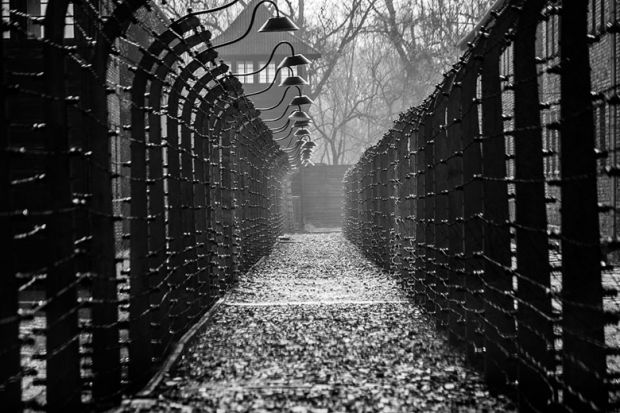A few weeks ago, we participated in an extraordinary visit to Auschwitz organised by the Holocaust Educational Trust. It was an extension of the Lessons from Auschwitz school programme that has run for 19 years, but this time it was aimed at universities. More than 140 student sabbatical officers and senior leaders from about 50 UK universities took part.
Our programme started on a Sunday afternoon at an airport hotel in London, where we heard from Susan Pollack – an 88-year-old Hungarian Jew who, along with her brother, survived the industrialised murder at Birkenau (the second and larger of the Auschwitz camps).
We heard her life story through a series of anecdotes. It started with illustrations of pre-war antisemitism; her uncle was murdered by fascists in 1938. Susan went on to describe how, after the outbreak of war, her father was lured with other Jewish men to a meeting under false pretences and taken away to a concentration camp – never to be seen again.
Susan told us about the process of “selection” as prisoners were herded off the freight wagons at Birkenau and how someone saved her life by telling her to lie about her age and say that she was 16 years old (younger children were sent straight to their death).
On the camp’s liberation in April 1945, Susan was extraordinarily lucky to be discovered by a British soldier who saw her unconscious body twitching in the building where she lay. Through simple and powerful words, Susan was able to give us a sense of the horrors that she had experienced.
The next day, we boarded a chartered plane to Kraków, Poland, and then travelled by coach to the town of Oświęcim (the Polish for Auschwitz, which is a Germanised name). In the interwar years, more than half of the population of Oświęcim was Jewish, but today no Jews live there.
A five-minute coach ride out of town brought us to the Auschwitz camp, now a memorial. Auschwitz was actually a network of camps, with Birkenau (or Auschwitz II as it is also known) being the larger, purpose-built death camp some 3km away.
Auschwitz I was for imprisoned labourers who were not Jewish – political prisoners, Russian POWs, homosexuals, criminals, Jehovah’s Witnesses – and were not part of the “final solution” but were nonetheless treated with extreme cruelty.
The brick barrack buildings housed Holocaust memorial exhibitions, including thousands of photographs of Polish prisoners. The Nazis had developed such an effective record and accounting system that each photo has the victim’s date of birth, the time that they were imprisoned and the time of their death.
The book of names housed in a large room in Block 27 served as an arresting illustration of the scale of the Holocaust. Yad Vashem, Israel’s national authority for the remembrance of the Holocaust and its victims, has undertaken the vast and complex task of collecting the names of the murdered that are recorded in this book whose suspended pages fill an entire room.
Other poignant and horrific reminders of the brutality of the Nazis were the pile of children’s shoes taken on arrival, the 200kg of human hair shaved from the prisoners, the execution wall and Crematorium 1, the gas chambers with light coming through the vents from which the hydrogen cyanide pellets were dropped, and the purpose-built ovens used for cremation.
At Birkenau, we were taken aback by the camp’s sheer scale. We walked wrapped in winter coats, hats and scarves as the sun set and a bitterly cold wind cut across the exposed landscape, serving as a stark reminder that prisoners were typically clothed only in flimsy pyjamas.
Here, the arrivals were predominantly Jewish and were selected either for labour or the gas chamber. As they disembarked from the overcrowded freight wagons, their fate was decided by a flick of the hand.
The long day finished with a moving ceremony in which we heard a number of memorial poems and an impassioned speech from Rabbi Andrew Shaw about the re-emergence of hate and antisemitism in the UK. No doubt it was a jarring message for many university representatives – students and staff alike – but he was unequivocal on our collective responsibility to eradicate all forms of hatred from our campuses.
And he is right. Universities have a role to play both as places for higher education and formative institutions in our communities. We can debate the historical facts; we can argue about Israeli politics; we can protect free speech without fear and within the law, but we must be places where intolerance, racism and antisemitism are not allowed to go unchallenged. We have to be places that embrace, engage with and understand the “other” – a word that Susan Pollack used.
This is a core purpose of universities and something that we cannot shrink from in an increasingly polarised world, in which populism and extremism are making an unwelcome return. Ten days after the visit, we reconvened in London to decide what we would do as both institutions and individuals to ensure that we learn the lessons from Auschwitz. We are both committed to working closely with our student bodies to take forward these lessons. For example, both our institutions will commemorate Holocaust Memorial Day while King’s is planning to host a seminar with the student union on eradicating hate from campus, and Lancaster aims to hold a seminar and publicise the Lessons From Auschwitz trip.
Giles Carden is chief of staff at Lancaster University and Jonathan Grant is professor of public policy and vice-president and vice-principal (service) at King’s College London.
Register to continue
Why register?
- Registration is free and only takes a moment
- Once registered, you can read 3 articles a month
- Sign up for our newsletter
Subscribe
Or subscribe for unlimited access to:
- Unlimited access to news, views, insights & reviews
- Digital editions
- Digital access to THE’s university and college rankings analysis
Already registered or a current subscriber? Login



